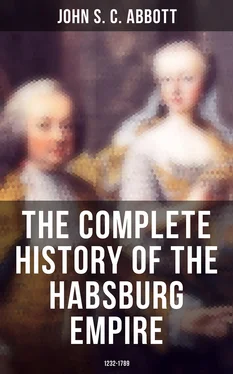Conscious of his power, and rejoicing in the imperial title, he had no idea of playing an obscure part on the conspicuous stage of European affairs. With an eagle eye he watched the condition of the empire, and no less eagerly did he fix his eye upon the movements of those great southern powers, now becoming consolidated into kingdoms and empires, and marshaling armies which threatened again to bring all Europe under a dominion as wide and despotic as that of Rome.
Charles VIII., King of France, crossed the Alps with an army of twenty-two thousand men, in the highest state of discipline, and armed with all the modern enginery of war. With ease he subjugated Tuscany, and in a triumphant march through Pisa and Siena, entered Rome as a conqueror. It was the 31st of December, 1394, when Charles, by torchlight, at the head of his exultant troops, entered the eternal city. The pope threw himself into the castle of St. Angelo, but was soon compelled to capitulate and to resign all his fortresses to the conqueror. Charles then continued his march to Naples, which he reached on the 22d of February. He overran and subjugated the whole kingdom, and, having consolidated his conquest, entered Naples on a white steed, beneath imperial banners, and arrogantly assumed the title of King of Naples, Sicily and Jerusalem. Alphonso, King of Naples, in despair, abdicated in favor of his son, Ferdinand; and Ferdinand, unable to oppose any effectual resistance, abandoned his kingdom to the conqueror, and fled to the island of Ischia.
These alarming aggressions on the part of France, already very powerful, excited general consternation throughout Europe. Maximilian, as emperor, was highly incensed, and roused all his energies to check the progress of so dangerous a rival. The Austrian States alone could by no means cope with the kingdom of France. Maximilian sent agents to the pope, to the Dukes of Milan and Florence, and to the King of Arragon, and formed a secret league to expel the French from Italy, and restore Ferdinand to Naples. It was understood that the strength of France was such, that this enterprise could only be achieved through a long war, and that the allies must continue united to prevent France, when once expelled from Italy, from renewing her aggressions. The league was to continue twenty-two years. The pope was to furnish six thousand men, and the other Italian States twelve thousand. Maximilian promised to furnish nine thousand. Venice granted the troops of the emperor a free passage through her dominions.
These important first steps being thus taken secretly and securely, the emperor summoned a diet of Germany to enlist the States of the empire in the enterprise. This was the most difficult task, and yet nothing could be accomplished without the coöperation of Germany. But the Germanic States, loosely held together, jealous of each other, each grasping solely at its own aggrandizement, reluctantly delegating any power to the emperor, were slow to promise coöperation in any general enterprise, and having promised, were still slower to perform. The emperor had no power to enforce the fulfillment of agreements, and could only supplicate. During the long reign of Frederic the imperial dignity had lapsed more and more into an empty title; and Maximilian had an arduous task before him in securing even respectful attention to his demands. He was fully aware of the difficulties, and made arrangements accordingly.
The memorable diet was summoned at Worms, on the 26th of May, 1496. The emperor had succeeded, by great exertion, in assembling a more numerous concourse of the princes and nobles of the empire than had ever met on a similar occasion. He presided in person, and in a long and earnest address endeavored to rouse the empire to a sense of its own dignity and its own high mission as the regulator of the affairs of Europe. He spoke earnestly of their duty to combine and chastise the insolence of the Turks; but waiving that for the present moment, he unfolded to them the danger to which Europe was immediately and imminently exposed by the encroachments of France. To add to the force of his words, he introduced ambassadors from the King of Naples, who informed the assembly of the conquests of the French, of their haughty bearing, and implored the aid of the diet to repel the invaders. The Duke of Milan was then presented, and, as a member of the empire, he implored as a favor and claimed as a right, the armies of the empire for the salvation of his duchy. And then the legate of the pope, in the robes of the Church, and speaking in the name of the Holy Father to his children, pathetically described the indignities to which the pope had been exposed, driven from his palace, bombarded in the fortress to which he had retreated, compelled to capitulate and leave his kingdom in the hands of the enemy; he expatiated upon the impiety of the French troops, the sacrilegious horrors of which they had been guilty, and in tones of eloquence hardly surpassed by Peter the Hermit, strove to rouse them to a crusade for the rescue of the pope and his sacred possessions.
Maximilian had now exhausted all his powers of persuasion. He had done apparently enough to rouse every heart to intensest action. But the diet listened coldly to all these appeals, and then in substance replied,
"We admit the necessity of checking the incursions of the Turks; we admit that it is important to check the progress of the French. But our first duty is to secure peace in Germany. The States of the empire are embroiled in incessant wars with each other. All attempts to prevent these private wars between the States of the empire have hitherto failed. Before we can vote money and men for any foreign enterprise whatever, we must secure internal tranquillity. This can only be done by establishing a supreme tribunal, supported by a power which can enforce its decisions."
These views were so manifestly judicious, that Maximilian assented to them, and, anxious to lose no time in raising troops to expel the French from Italy, he set immediately about the organization of an imperial tribunal to regulate the internal affairs of the empire. A court was created called the Imperial Chamber. It was composed of a president and sixteen judges, half of whom were taken from the army, and half from the class of scholars. To secure impartiality, the judges held their office for life. A majority of suffrages decided a question and in case of a tie, the president gave a casting vote. The emperor reserved the right of deciding certain questions himself. This court gradually became one of the most important and salutary institutions of the German empire.
By the 7th of August these important measures were arranged. Maximilian had made great concessions of his imperial dignity in transferring so much of his nominal power to the Imperial Chamber, and he was now sanguine that the States would vote him the supplies which were needed to expel the French from Italy, or, in more honest words, to win for the empire in Italy that ascendency which France had attained. But bitter indeed was his disappointment. After long deliberation and vexatious delays, the diet voted a ridiculous sum, less than one hundred and fifty thousand dollars, to raise an army "sufficient to check the progress of the French." One third of this sum Maximilian was to raise from his Austrian States; the remaining two thirds he was permitted to obtain by a loan. Four years were to be allowed for raising the money, and the emperor, as a condition for the reception of even this miserable boon, was required to pledge his word of honor that at the expiration of the four years he would raise no more. And even these hundred and fifty thousand dollars were to be intrusted to seven treasurers, to be administered according to their discretion. One only of these treasurers was to be chosen by the emperor, and the other six by the diet.
Читать дальше












